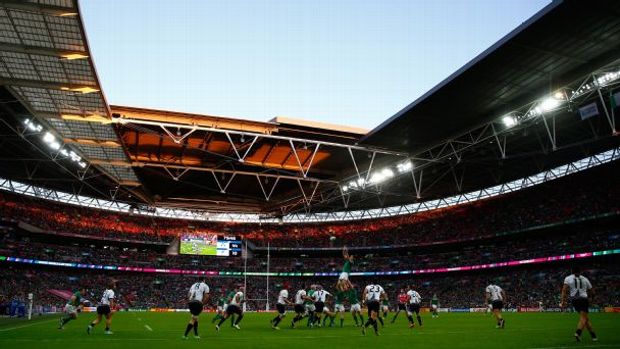|
Six Nations
Georgia and Romania still dreaming of Six Nations chance
Rob Bartlett
March 23, 2016
 Georgia's players celebrate after winning a Pool C match of the 2015 Rugby World Cup between Tonga and Georgia© AFP PHOTO / BERTRAND LANGLOIS LONDON -- Introducing promotion and relegation into the Six Nations is still a pipe dream. The subject, according to Rugby Europe chief executive Octavian Morariu, is "very sensitive" and one that must be treated very carefully. For the likes of Georgia and Romania, it could prove a long wait. Europe's leading tier two nations sparked an awakening with their performances at last year's World Cup which, aided by Italy's disheartened showing in this year's championship, prompted calls for their potential inclusion into the northern hemisphere's most lucrative competition. While "informal discussions" have taken place, there remains an air of caution to press the issue. "We need to identify the criteria that must be satisfied," Morariu told ESPN. "This is already a very difficult task in itself and we need to be careful. I don't think this is a subject for the short-term. It is a subject for the long-term, and maybe it is not the only answer." It is a subject that has divided opinion. Warren Gatland, the Wales head coach, recently raised the question of a play-off match between the team that finishes bottom of the Six Nations and the European Nations Cup champions, with the winner taking part in the main competition.
Six Nations chief executive John Feehan, though, said in January that the Six Nations was a "closed tournament" and that change was not on the agenda. "It is not the job of the Six Nations to provide solutions for Georgia, Romania, or anyone else," he said. But for Georgia and, to a lesser extent Romania, international stagnation is a fast becoming a reality. Shortly before England's Grand Slam triumph in Paris, Georgia defeated Romania in front of 52,342 people to claim their sixth successive European Nations Cup: a tournament that features Russia, Portugal, Spain and Germany and includes promotion and relegation. Georgia and Romania have finished winners and runners-up respectively five times in the last six years, while the Lelos remain unbeaten in the competition since 2012. "It's getting a bit tired," Georgia head coach Milton Haig said. "For the improvement in our rugby, it's vital we find a competition that extends us a bit more. "If it's going to cost us some money [to join the Six Nations], tell us how much, and I'm sure our government and our benefactors would jump at the chance to try and finance something like that. It's not about keeping the status quo, but looking at potential, of what you could develop. And about adding value to the current competition. We can add value." Value is the key word. The Six Nations is a highly lucrative commercial entity and privately run by the six representatives that compete in it. Understandably, there remains a reluctance to open up the competition and share the spoils but Morariu insists commercial output would not be lessened should the format change.  Georgia supporters arrive for the Group C Rugby World Cup match between Tonga and Georgia© David Jones/Getty Images "I've seen comments in the past saying 'Romania and Georgia will not fill the stadium'. And 'Romania and Georgia wouldn't bring the same commercial output'," Morariu said. "Ireland against Georgia in Dublin last year was a success and if you look at the largest attendance at the Rugby World Cup last year, it was for Ireland against Romania." The gap appeared to be closing at the lower age grade. Georgia have steadily progressed in the under-18 Six Nations over the last eight years and in 2015, they reached the final following victories over Ireland and Italy, eventually losing out to France. However, the decision of the four home nations and Italy to withdraw from this year's edition has done little to ease the tensions. "If Georgia can perform so well against Six Nations teams at this level, this is the future of Georgian rugby," Georgia general secretary Lasha Khurtsidze said. "So, logically, one might think that if the future of your rugby can compete against England, Ireland, and Scotland -- why won't they be able to compete three years down the line against the same opposition? Georgia and Portugal started beating the likes of Scotland and then suddenly, out of the blue, the home nations pulled out. I cannot understand this." According to Morariu, though, the crux of the issue is not promotion and relegation within the Six Nations. It is making sure tier two countries in Europe are given regular opportunities to play the leading nations. Romania, for example, did not play a tier one nation once between the 2011 and 2015 World Cups. "For all of the other teams in Europe to get to the higher levels, you can only do this by changing things," Romania team manager Horatiu Bargaunas said. "If we have more games against tier one opposition our level will go up. That would be good for rugby worldwide, not just for us. The only way we will improve is to play better teams."  A general view of the action during the 2015 Rugby World Cup Pool D match between Ireland and Romania at Wembley Stadium© Shaun Botterill/Getty Images Georgia's Khurtsidze shares similar sentiment: "There has to be something. You cannot just stay in the one place forever, waiting for the World Cup to play better opposition and to develop. Because that is what it is about, development." Morariu praised the approach taken by World Rugby to invest in the improvement of tier two nations. While the governing body does not have the power to change the Six Nations, it has been working closely with Rugby Europe to try and secure more fixtures against tier one nations. "What's important for World Rugby is that we ensure that tier two nations play tier ones and get the competition they require to progress as countries," World Rugby chief executive Brett Gosper told ESPN. "If that's not possible in a Six Nations set-up then we'll find other ways of doing it and we're exploring that ourselves." The short term solution and, according to Morariu, the "first step towards integration" would be giving nations such as Georgia and Romania more games against tier one countries during the June and November international windows.
"This can be done with less disturbance to the present system, it would be easier to do without disrupting the present environment too much but in the same time show the willingness to change," Morariu said. "We need to start the change if we want these teams to become better. We cannot go on like this and we need to reach out to a new dimension if we want to grow the game globally." So, will we see Georgia and Romania break into the Six Nations any time soon? "The Rugby Europe president and the international media in general has been talking about this a lot but there is nothing you can do when it comes to a commercial unit," Khurtsidze admitted. "You can talk as much as you want but at the end of the day it's up to that unit to plan their strategy and future. "However, these international opinions are important and they matter. They can help change the game." © Rob Bartlett
|
Live Sports
Communication error please reload the page.
-
Football
-
Cricket
-
Rugby
-
- Days
- Hrs
- Mins
- Secs
F1 - Abu Dhabi GP
Abu Dhabi Grand Prix December 11-131. Max Verstappen ()
2. Valtteri Bottas (Mercedes)
3. Lewis Hamilton (Mercedes)
4. Alexander Albon ()
5. Lando Norris ()
6. Carlos Sainz Jr ()
-
ESPNOtherLive >>
Golf - Houston Open
Snooker - China Open
Tennis - Miami Open

